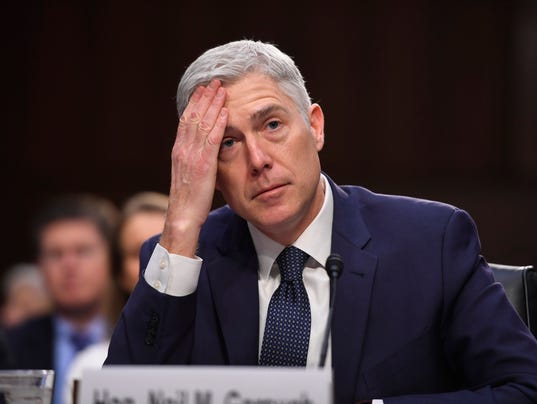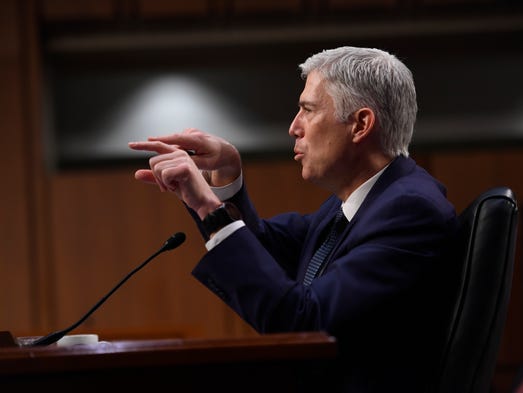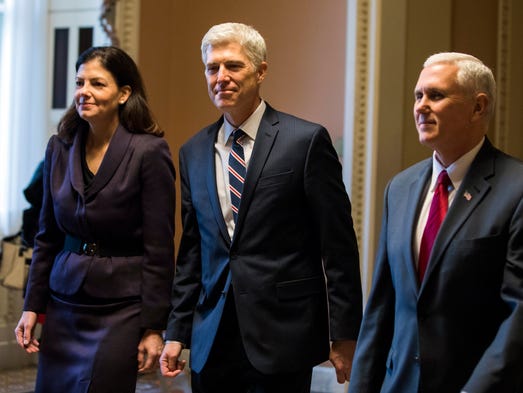
Supreme Court nominee Neil Gorsuch looked weary on his third day before the Senate Judiciary Committee on March 22, 2017. (Photo: Jack Gruber, USA TODAY)
WASHINGTON — Supreme Court nominee Neil Gorsuch says judges should focus "backward, not forward" when deciding cases by looking, among other things, to past court precedents. But through more than 20 hours of testimony before Congress, he only grudgingly endorsed the oldest and most popular of those precedents, refusing to offer his opinions on those decided in recent decades and by narrow majorities.
His refusal to take sides on cases decided by the Supreme Court involving abortion, gun control, campaign finance and gay rights added to the concerns of Democrats already inclined to oppose him for other reasons: Republicans' refusal to consider President Obama's nominee, Merrick Garland, last year; President Trump's avowed use of a litmus test to ensure Gorsuch would be a staunch conservative; and a year-long, multimillion-dollar campaign financed by unknown donors.
Sen. Dianne Feinstein of California, the top Democrat on the Senate Judiciary Committee, gave voice to those concerns Monday to illustrate why Democrats are "in just a terrible position" with confirmation votes scheduled for next week. She recalled how difficult it was to get Gorsuch even to address the unanimous Brown v. Board of Education decision of 1954 striking down public school segregation.
Under questioning from Sen. Richard Blumenthal, D-Conn., Gorsuch said the ruling vindicated the correct original meaning of the 14th Amendment. He called it "one of the shining moments in constitutional history in the United States Supreme Court."
But getting Gorsuch to comment favorably on other high court precedents proved difficult, much to Democrats' dismay. He eventually said positive things about two decisions from the 1960s — Griswold v. Connecticut, which struck down state bans on contraceptives by a 7-2 vote, and Loving v. Virginia, a unanimous ruling that invalidated state laws against interracial marriage.
That's about as far as the 49-year-old federal appeals court judge from Colorado was willing to go. On more recent, controversial cases — notably Roe v. Wade, which legalized abortion in 1973 and was upheld in a related case two decades later — he steadfastly refused to state his views.
"The reliance interest considerations are important there, and all the other factors that go into analyzing precedent have to be considered," Gorsuch said. Pressed by Feinstein on whether Roe has become a "super-precedent," he said only, "It has been reaffirmed many times, I can say that."
Read more:
Big money behind Supreme Court nominee Neil Gorsuch shows little payoff
Analysis: Neil Gorsuch could lead Supreme Court to a new conservative era
Neil Gorsuch: Stellar résumé and Scalia-like legal philosophy
Who is Neil Gorsuch? A guide to the Supreme Court nominee
On some of the court's most closely decided cases of the past decade, Gorsuch dodged repeated questions:
- On Heller v. District of Columbia, the 5-4 decision in 2008 that protected the right to own firearms for self-defense, he said "the dissent and the majority opinion were both very fine opinions, very thoughtful."
- On Citizens United v. Federal Election Commission, the 5-4 ruling in 2010 that struck down limits on election campaign spending by corporations, he said Congress still can intercede. "There's ample room in the area of campaign finance for further legislation," he said.
- On Obergefell v. Hodges, the 5-4 decision in 2015 that legalized same-sex marriage, he blocked all efforts to solicit his views. "There is ongoing litigation about its impact and its application right now," Gorsuch said.
"For a judge to start tipping his or her hand about whether they like or dislike this or that precedent would send the wrong signal," he said. "It would send a signal to the American people that the judge's personal views have something to do with the judge's job."
Democrats on the committees complained that the last two justices nominated by a Republican president, Chief Justice John Roberts and Justice Samuel Alito, had been more specific. But more recently, Obama nominees Sonia Sotomayor and Elena Kagan were equally evasive.

Supreme Court justices Elena Kagan and Sonia Sotomayor were evasive on past precedents during their confirmation hearings in 2010 and 2009, respectively. (Photo: Allison Shelley, Getty Images)
In 2009, Sotomayor told the panel that Roe v. Wade was settled law. On guns, she merely expressed support for the Second Amendment.
In 2010, Kagan used the same phrase to characterize Roe but added, "The application of Roe to future cases, and even its continued validity, are issues likely to come before the court in the future."
Yale Law School professor Akhil Reed Amar, a constitutional expert, said Supreme Court nominees of both parties have been more evasive than required when addressing past precedents.
"The ground rules for the Gorsuch hearings — what can be asked and what should be answered — are not exactly intellectually defensible on either side," he said. "This has been the sad truth about past hearings as well, for nominees of both parties and senators of both parties."
While Gorsuch would have preferred to remain a blank slate on all precedents, he did say which ones merit more or less deference. His definition was drawn in part from an 800-page tome he co-authored, "The Law of Judicial Precedent," which he said "makes a great doorstop."
It depends, Gorsuch said, on "the age of the precedent, how often it's been reaffirmed, the reliance interests surrounding it, whether it was correctly decided, whether it was constitutional versus statutory, and a number of other things."
So in a case such as Griswold, he said, more than 50 years of couples relying on the legal use of contraceptives makes it a "strong" precedent. States are not likely to try to pass new laws reversing that ruling, he said, and the Supreme Court would not take such efforts seriously.
"I don't know how clear I could be to you, senator," he added.
"You could be much more clear about your personal beliefs," Blumenthal responded.
"Right, and my personal views have nothing to do with my job as a judge," Gorsuch shot back.
Posted!
A link has been posted to your Facebook feed.














































Like this topic? You may also like these photo galleries:
-
1 of 46
-
2 of 46
-
 3 of 46
3 of 46 -
 4 of 46
4 of 46 -
 5 of 46
5 of 46 -
 6 of 46
6 of 46 -
 7 of 46
7 of 46 -
 8 of 46
8 of 46 -
 9 of 46
9 of 46 -
 10 of 46
10 of 46 -
 11 of 46
11 of 46 -
 12 of 46
12 of 46 -
 13 of 46
13 of 46 -
 14 of 46
14 of 46 -
 15 of 46
15 of 46 -
 16 of 46
16 of 46 -
 17 of 46
17 of 46 -
 18 of 46
18 of 46 -
 19 of 46
19 of 46 -
 20 of 46
20 of 46 -
 21 of 46
21 of 46 -
 22 of 46
22 of 46 -
 23 of 46
23 of 46 -
 24 of 46
24 of 46 -
 25 of 46
25 of 46 -
 26 of 46
26 of 46 -
 27 of 46
27 of 46 -
 28 of 46
28 of 46 -
 29 of 46
29 of 46 -
 30 of 46
30 of 46 -
 31 of 46
31 of 46 -
 32 of 46
32 of 46 -
 33 of 46
33 of 46 -
 34 of 46
34 of 46 -
 35 of 46
35 of 46 -
 36 of 46
36 of 46 -
 37 of 46
37 of 46 -
 38 of 46
38 of 46 -
 39 of 46
39 of 46 -
 40 of 46
40 of 46 -
 41 of 46
41 of 46 -
 42 of 46
42 of 46 -
 43 of 46
43 of 46 -
 44 of 46
44 of 46 -
 45 of 46
45 of 46 -
 46 of 46
46 of 46
Không có nhận xét nào:
Đăng nhận xét